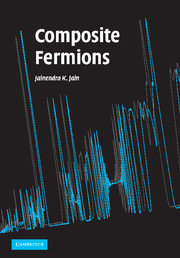Book contents
- Frontmatter
- Contents
- Preface
- List of symbols and abbreviations
- 1 Overview
- 2 Quantum Hall effect
- 3 Landau levels
- 4 Theory of the IQHE
- 5 Foundations of the composite fermion theory
- 6 Microscopic verifications
- 7 Theory of the FQHE
- 8 Incompressible ground states and their excitations
- 9 Topology and quantizations
- 10 Composite fermion Fermi sea
- 11 Composite fermions with spin
- 12 Non-composite fermion approaches
- 13 Bilayer FQHE
- 14 Edge physics
- 15 Composite fermion crystals
- Appendixes
- References
- Index
8 - Incompressible ground states and their excitations
Published online by Cambridge University Press: 07 December 2009
- Frontmatter
- Contents
- Preface
- List of symbols and abbreviations
- 1 Overview
- 2 Quantum Hall effect
- 3 Landau levels
- 4 Theory of the IQHE
- 5 Foundations of the composite fermion theory
- 6 Microscopic verifications
- 7 Theory of the FQHE
- 8 Incompressible ground states and their excitations
- 9 Topology and quantizations
- 10 Composite fermion Fermi sea
- 11 Composite fermions with spin
- 12 Non-composite fermion approaches
- 13 Bilayer FQHE
- 14 Edge physics
- 15 Composite fermion crystals
- Appendixes
- References
- Index
Summary
This chapter is devoted to the properties of incompressible ground states and their excitations. Ground state properties, such as pair correlation function and static structure factor, as well as energies of several kinds of charged and neutral excitations are evaluated using the CF theory. Quantities in the thermodynamic limit are obtained by an extrapolation of finite system results. Experimental studies of the FQHE state through transport, inelastic light scattering, and scattering by ballistic phonons have identified a variety of excitations which can be compared to theory. As we have seen in Chapter 6, the CF theory predicts excitation energies with an accuracy of a few % for N < 12. A reasonable expectation is that the thermodynamic limits obtained from the CF theory are also accurate to within a small percentage. Unfortunately, a comparison with real life experiments also necessitates an inclusion of the effects of nonzero thickness of the electron wave function, Landau level mixing, and disorder, which are not as well understood as the FQHE, and the accuracy of quantitative comparisons between theory and experiment is determined largely by the accuracy with which these other effects can be incorporated into theory. At present, the quantitative agreement between theory and laboratory experiment is roughly within a factor of two, although a 10–20% agreement has been achieved in some cases. Fully spin-polarized FQHE is assumed throughout this chapter; the spin physics is the topic of Chapter 11.
- Type
- Chapter
- Information
- Composite Fermions , pp. 217 - 252Publisher: Cambridge University PressPrint publication year: 2007



